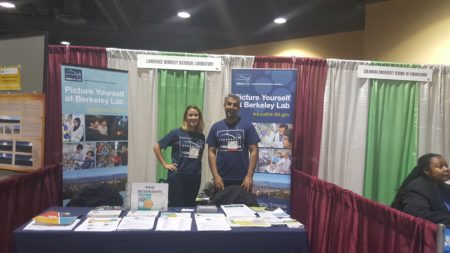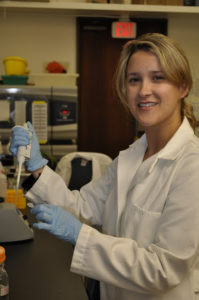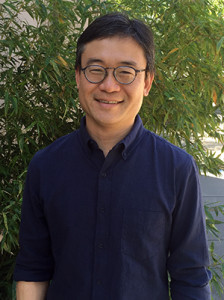 The Ambassador Program was piloted in 2015 with the goal of advancing outreach efforts aimed at increasing underrepresented populations at the Lab. Scientists, engineers, and operations staff attended targeted conferences and events as Ambassadors, establishing relationships with selected organizations, and helping to develop a robust pipeline of qualified STEM and operations employees. The program is coordinated in partnership with the Diversity and Inclusion Office (DIO), Workforce Development & Education (WD&E), and the Lab Directorate. The DIO and WD&E fund travel and conference registration, while the Division sponsors the Ambassador’s time at the conference.
The Ambassador Program was piloted in 2015 with the goal of advancing outreach efforts aimed at increasing underrepresented populations at the Lab. Scientists, engineers, and operations staff attended targeted conferences and events as Ambassadors, establishing relationships with selected organizations, and helping to develop a robust pipeline of qualified STEM and operations employees. The program is coordinated in partnership with the Diversity and Inclusion Office (DIO), Workforce Development & Education (WD&E), and the Lab Directorate. The DIO and WD&E fund travel and conference registration, while the Division sponsors the Ambassador’s time at the conference.
Since its launch, the Ambassador Program has sent Lab staff to the following conferences:
- Alex Kim, Physics: National Society of Black Physicists (NSBP)
- Chris Payne, BTUS: Society for the Advancement of Chicanos and Native Americans in Science (SACNAS)
- Christine Shulse (pictured above with Recruiter Rasool Yousufzai), JGI: Society for the Advancement of Chicanos and Native Americans in Science (SACNAS)
- Henrik Von Der Lippe and Ross Schlueter, Engineering: Society of Hispanic Professional Engineers (SHPE)
- Steven Wilson, JGI: National Society of Black Engineers (NSBE)
In addition to the conferences listed above, Ambassadors will also attend the following events in 2017:
- Esther Singer, JGI: California Alliance for Minority Participation (CAMP)
- Gonçalo Ferreira Cardoso, ESDR: Emerging Researchers Network (ERN)
- Amanda Krieger, Engineering: National Organization of Gay and Lesbian Scientists and Technical Professionals (NOGLSTP)
- Paul Mathew, BTUS: Be Everything You Are (BEYA)
- Hans Johansen, American Indian Science and Engineering Society (AISES)
- JGI TBD, Annual Biomedical Research Conference for Minority Students (ABRCMS)
- TBD, National Society of Black Engineers (NSBE)
- TBD, National Society of Black Physicists (NSBP)
- TBD, Society for Advancement of Chicano/Native Americans in Science (including Native Alaskans) (SACNAS)
- Engineering TBD, Society of Hispanic Professional Engineers (SHPE)
Click here to learn more about the program, including: the role of the Ambassador, the role of DIO and WD&E, and the role of Division leadership.
If you’re interested in becoming an Ambassador, please complete our Ambassador Program Interest Form. For any questions, please contact dio@lbl.gov.
* * *
 Testimony from Ambassador Christine Shulse (Joint Genome Institute):
Testimony from Ambassador Christine Shulse (Joint Genome Institute):
“The Ambassador Program is important for the Lab and Divisions because it introduces more potential employees to the Lab, and gives us the opportunity to compete for diverse employees that might otherwise go elsewhere. It allows participants to make contact with Lab employees, who can potentially help them when they apply. It also allows students to be aware of available internship opportunities.
My favorite part about being an Ambassador is meeting all of the great students and hearing about their research as a judge at the poster sessions. Of course I also liked getting to experience the conference programming myself, as well as the travel and the opportunity to catch up with former friends/colleagues in my field at the conference.
Lab employees should consider joining the program because it is an opportunity to help create the sort of Berkeley Lab I think most of us want to see – top scientists from diverse backgrounds. With the current Berkeley Lab stats on the ethnicity and gender breakdown of scientists and engineers, I think this is especially important.”
* * *
 Testimony from Ambassador Alex Kim (Physics):
Testimony from Ambassador Alex Kim (Physics):
“The fact that our national demographics are not reflected in the constitution of Lab scientists (and scientists in general) is indicative of uneven opportunity. The Ambassador Program works to ensure equal access to information, specifically the opportunities available and paths toward a scientific career. Advancing equal opportunity is important for a healthy society, of which the Lab is a part. Conference participants and students gain access to Lab scientists with career experiences and perspectives that they may not otherwise have been exposed to. They also learn about real work opportunities available at the Labs.
As an Ambassador, I learn as much from the attendees as they do from me. I also get to meet potential new students and collaborators.”
